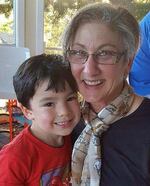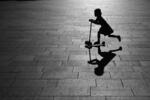
Foster parent Rene Denfeld poses for a selfie in Washington Park with two of her children, who she adopted from foster care.
Photo courtesy Rene Denfeld
In January, the Oregon Secretary of State’s office released an
of Office of Child Welfare. The audit revealed numerous problems throughout the system. One of the findings was that DHS struggles to retain and support foster homes in its network.
In our coverage of the child welfare system, following the release of the audit, we’ve spoken with DHS leadership, a child welfare advocate, current caseworkers, and a former child welfare director. Recently, “Think Out Loud” host Dave Miller spoke with two women who have fostered children in Oregon. Linda Scott and Rene Denfeld have had different experiences, but both agree there are many problems with Oregon’s foster system.
On why they decided to foster children
Linda Scott wasn’t interested in starting a family until she was in her fifties. When she realized she could foster a child, she went to DHS for foster parent training. She said, “I figured even if I didn’t know anything about parenting I could keep a kid safe.” She ended up fostering two high school aged boys at different times.
Rene Denfeld has
her adopted children, and often tells people the best choice she ever made was the decision to foster a child. She brought home her first child over 20 years ago. She said as far as she knew she was able to have a biological child, but: “I knew that there were a half a million kids in foster care that needed a mom, and I wanted to be a mom so it made perfect sense.”
On the challenges of fostering a child
There is a public perception that people who foster children do it to make money. But, with the special circumstances foster children are in, Denfeld says she finds it hard to believe anyone could come out ahead, financially: “That little girl came to me as a newborn with special needs, and I believe my monthly subsidy was about $360, which for a newborn baby doesn’t begin to cover the cost of diapers and miscellaneous things.”

Former foster parent, Linda Scott, pictured with her grand-nephew, Xavier Martinez.
Photo courtesy Linda Scott
Teenage boys in the child welfare system have the most difficulty finding homes. When the second teen Linda Scott fostered arrived at her house she said, "He told me he wanted to be an independent minor, he was done with DHS." Scott says she told him she would support him in his efforts, and about a month later he decided to stay. Unfortunately, she says, difficulties in navigating the system resulted in his being removed from her home, something neither of them wanted.
Difficulties inherent in the child welfare system
One of the findings of the DHS audit was that a number of staffing challenges compromise the ability of the organization to perform essential functions. Linda Scott had a lot of trouble communicating with her foster son's caseworker. She said, "I tried to intervene with her shaming and blaming my kid. I was trying to shield him so that she wouldn't leave him so upset he couldn't do other things."
Both Scott and Denfeld acknowledge that some of the problems DHS is facing are out of its control: Denfeld says, "We're not giving the agency the help it needs, and then we're pointing the finger and castigating them for the problem that we created culturally."
Assessing the experience of being a foster parent
Rene Denfeld created her family by adopting within the child welfare system, and she's still passionate about fostering kids while their family of origin works with DHS to be reunited with them. It's hard but critical work, she says.
For her part, Linda Scott told OPB that despite her differences with the child welfare system, fostering remains one of the single most important and rewarding experiences she's ever had.

Young girl on scooter. Photo illustration used with permission.
Marvin Girbig/Flickr
'Think Out Loud' On Oregon's Child Welfare System
You can read all of the articles and listen to the conversations in this series here:Part 1: How a Landmark Audit Could Change Oregon's Child Welfare DepartmentPart 2: Oregon Child Welfare Workers Say They Can't Keep Up, Do Prevention WorkPart 3: Former Child Welfare Director: DHS Must Reprioritize PreventionPart 4: Past And Present Foster ParentsPart 5: Stories From Inside Oregon's Troubled Foster Care SystemPart 6: Improving Legal Representation And Outcomes For Foster KidsPart 7: Contrasting Political Takes On Reforming The System